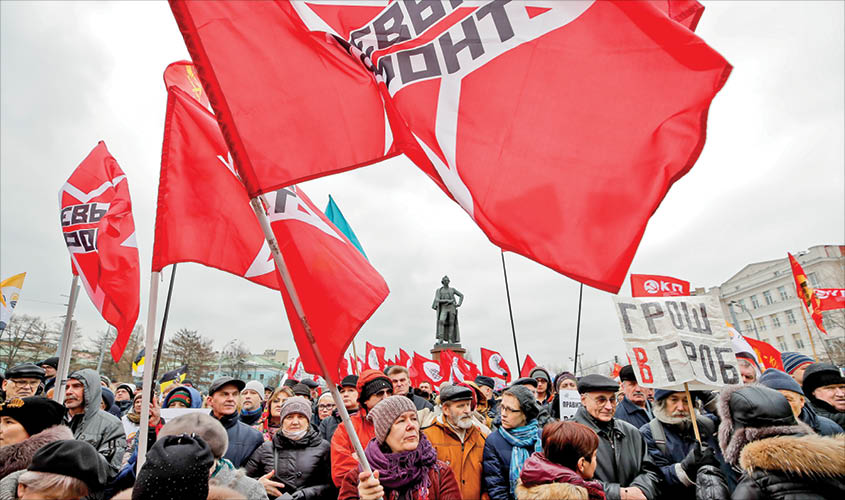There is a sense of economic gloom as tepid growth, five years of falling real incomes, high inflation, rising taxes and cuts to social hand-outs squeeze the population.
“Evelyn”, the female voice whispered over the telephone, “I know where you can buy some knickers”. It was Spring 1992 and the Soviet Union had collapsed a few months earlier. Life for the average Russian was hard and it was difficult to find even the basic necessities. Many shops were completely empty, except for an array of assistants behind the counter yawning and polishing their nails. On the drive to the embassy early in the morning, I would see long queues of women, stamping their feet in the cold Russian winter, in the hope of buying some milk. It was always women in the queue; most men would be still in bed suffering from a hangover from illicit alcohol.
If a woman discovered some goods in a local shop, she would keep the items and location secret, only divulging the precious information to a close circle of friends. This is how it worked in Moscow in those days. Information meant survival. In my wife Evelyn’s case, to follow up the tip from the phone call she would have to go about 10 stops on the Metro, followed by a 30-minute bus drive and a 15-minute walk to the shop, just for basic underwear. Suffice to say, she didn’t need to.
How things have changed over the past 27 years. Moscow shops are now bulging with goods. But today there is a different problem: money. Russians are getting poorer. According to Rosstat, Russia’s statistics agency, the average Russian has 13% less to spend this year than in 2013. More than a third of Russians cannot afford a pair of shoes each year, and almost half the population have no resources for a short annual holiday. There is a sense of deepening economic gloom in Russia as tepid growth, five years of falling real incomes, high inflation, rising taxes and cuts to social hand-outs squeeze its population.
Despite high oil prices and buoyant commodity markets, the government is keeping its spending tight, except for the military. Five years of Western sanctions and the threat of more to come are taking their toll on Russia’s $1.5 trillion economy. The state’s quarterly survey of consumer confidence remains low at -17%, largely due to the lack of any trickledown effect from the increasing wealth of those close to President Vladimir Putin. According to Russia’s state-run bank, the wealthiest 3% of Russians owned 89% of all financial assets in 2018. “If you want to see what happens when you have capitalism without democracy, look at Russia”, said Pete Buttigieg, a US Democratic 2020 presidential candidate. “It turns into crony capitalism and that turns into oligarchy”.
Russian oligarchs’ wealth is certainly skyrocketing, according to the Bloomberg’s Billionaires index. Its 23 richest billionaires grew richer by an amazing $22.3 billion in just the first three months of this year. Commodities magnate Vladimir Potanin raised his net worth by $1.67 billion to $21.3 billion; steel tycoon Vladimir Lisin by $2.64 billion to $20.5 billion; gas magnate Leonid Mikhelson by a modest $553 million to $20 billion; and oil tycoon Vagit Alekperov by $3.83 billion to a net worth of $19.9 billion. This is when more than one-fifth of Russian households do not have access to indoor plumbing. Russia leads the developed world with the worst sanitation record, according to the London-based Wateraid NGO.
Young Russians are certainly taking note of how the financial system is failing them. They are also unhappy with the increasing restriction on their freedom on the internet. A new law allows the authorities unprecedented control over information coming into the country and prevents any criticism of the government. “Under the pretext of our own security, they’re trying to sell us a second-hand, beta version of the Chinese firewall”, said Sarkis Darbinyan, a lawyer and member of Roskomsvoboda, a Moscow-based internet-freedom advocacy group. A free internet is probably more important to the enterprising young than even wealth or food!
Perhaps all this explains why so many want to leave Russia. A record high of one in five Russian citizens would like to move permanently to a different country, according to the finding of a Gallup poll conducted in Russia in 2018 and unveiled last week. Gallup has been polling Russians on this issue since 2007 and from 2014 the figures have been steadily rising. Not surprisingly, the results are skewed towards the young, with no less than 44% of young Russians between the ages of 15 and 29 wishing to leave, mostly to Germany. This drops to 9% in the 46 to 60 age group. Worryingly for President Putin the largest group are college graduates, but overall Russia could face losses of workers from all educational backgrounds and potentially all skill levels. This would create a dramatic effect on Russia’s demographics.
As in all advanced countries, it’s the earning power of the young which supports the pensions of the old. There has already been severe unrest at the government’s attempts to raise the retirement age from 60 to 65 for men and from 55 to 60 for women. A haemorrhaging of young workers will unquestionably exacerbate Putin’s problems, but he has only himself to blame for this predicament due to past flawed policy. Emigration and unrest are certain to increase in time. Presidents Putin’s traditional method of dealing with difficulties at home is to conduct military adventures abroad, as he did in illegally seizing Crimea in 2014. NATO will be holding its breath.
John Dobson worked in UK Prime Minister John Major’s Office between 1995 and 1998 and is presently Chairman of the Plymouth University of the Third Age.

